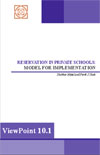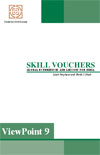| Research |
The Effects of School Vouchers on College Enrollment: Experimental Evidence from New York City
Authors: Matthew M. Chingos and Paul E. Peterson
The Brown Center on Education Policy at Brookings | Harvard's Program on Education Policy Governance
August 2012
Abstract: In the first study using a randomized experiment to measure the impact of school vouchers on college enrollment, we examine the college-going behavior through 2011 of students who participated in a voucher experiment as elementary school students in the late 1990s. We find no overall impacts on college enrollments but we do find large, statistically significant positive impacts on the college going of African American students who participated in the study. Our estimates indicate that using a voucher to attend private school increased the overall college enrollment rate among African Americans by 24 percent.
... read more |
| Education News |
| |
Why ‘profit’ is not a bad word
- Hindustan Times (Delhi), 26 Mar 2014
There are few areas where the difference between what Indians want for themselves and what the government of India wants for them is more alarming than in higher education. Six to eight hundred thousand Indians leave for foreign universities every year. Yet foreign universities are not allowed to set shop in India. |
Educating India
- Newslaundry, 31 Mar 2014
We are fond of quoting the fact that India is a young country with young aspirations. It’s no mean fact that India is projected to become the youngest country in the entire world by 2020 . A third of the country is below the age of 18, while another third is in the age group 18-35 and is projected to decide the fate of the nation in the upcoming election by constituting 50% of the total voting population of the country. While issues like wide unemployment and low employability remain keyto this segment, perhaps the wholescale destruction of the Indian education system and the upcoming demographic disaster is not getting as much attention as it deserves. |
Education system in India restricts innovation: Educationist
- The Times of India, 31 Mar 2014
NEW DELHI: Finding faults with the education system in India, an educationist with a New York-based university on Monday advocated the need for a change to allow freedom of creativity to promote innovation. |
Schools told to make up for poor RTE intake in ’13
- The Times of India, 27 Mar 2014
CHENNAI: Tamil Nadu has not even met half its targeted number of admissions in matriculation schools for the 2013-14 academic year under the 25% reservation clause of the Right To Free and Compulsory Education Act. |
9 Striking Similarities Between the Housing Bubble and The Higher Education Bubble
- The Huffington Post, 31 Mar 2014
With the collapse of the housing bubble and corresponding financial crisis of 2008 occurring just six years ago as of this writing (2014), concerns over a bubble in higher education are beginning to emerge. It's amazing how many similarities there are between what happened in housing and what's happening in higher education. Considering the causes and outcomes of the housing bubble may help inform what might happen in higher education. |
Common Core Failure
- Reason, April 2014
At the beginning of the 2013 school year, the Los Angeles Unified School District (LAUSD) implemented the first phase of a $1 billion initiative to provide an iPad to every student and teacher in the city's public schools. The program was intended to help "close the digital divide" between the rich and poor while meeting federal Common Core technology standards. But the project has been heavily criticized, and many of the participating schools have halted home iPad use. |
|
|
|
Poll
Four years since enactment, has the Right To Education made education in India any better?
To vote click here.
|
|
|
Video
 Sick: NYC's Bill de Blasio Puts Politics Before Poor Kids Sick: NYC's Bill de Blasio Puts Politics Before Poor Kids
The mayor has a vendetta against charter-school leader and former political rival Eva Moskowitz. Watch this video here.
|
|
Publications
 
|
| |
|
|



